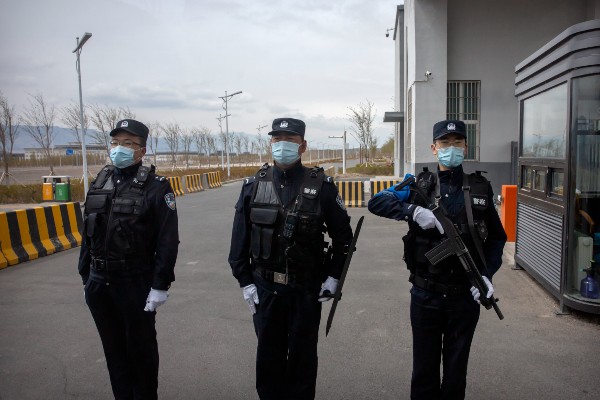Norway’s largest pension fund poured $150 million into companies associated with enslaving Uyghur Muslims in the Xinjiang province.
By Alana Goodman, Washington Free Beacon
A Norwegian pension fund that recently announced it planned to blacklist Israeli companies in the West Bank has poured hundreds of millions into Chinese companies linked to slave labor and Russian entities on the U.S. sanctions list.
Norges Bank’s Government Pension Fund Global, Norway’s largest pension fund, placed several Israeli companies in the West Bank on its “excluded companies” list earlier this month, citing “serious infringements of the rights of the individual in situations of war or conflict in connection with the construction of roads linked to Israeli settlements in the West Bank.”
At the same time, Norges held over $150 million in investments in at least seven companies that operated in or are suspected of using forced labor from the Xinjiang province of China, where Uyghur Muslims face human rights abuses, according to the fund’s most recent financial disclosures from last December.
The fund also held $1.8 billion in shares in at least six Russian energy companies and banks that are under U.S. financial restrictions or sanctions.
The fund’s investments raise questions about its decision-making process for divestments. While Norges Bank cut ties with Israeli companies, it has yet to bar controversial Russian and Chinese companies from future investments. Anti-Israel boycotts are growing more common in progressive circles. Earlier this year, Ben & Jerry’s announced it was ending its operations in the West Bank, prompting a wave of public backlash and the threat of financial penalties against the ice cream company from several U.S. states.
“The decisions made by the Executive Board of Norges Bank, announced last week, were made based on recommendations from the Council on Ethics,” said Line Aaltvedt, a spokesman for Norges Bank. “The Ministry of Finance has established the independent Council on Ethics to evaluate whether or not the fund’s investments in specified companies is consistent with its Ethical Guidelines.”
Norges Bank did not indicate whether it still holds shares in Chinese companies linked to slave labor or Russian firms under U.S. sanctions. The fund said last year that it would be reviewing its investments in companies that are linked to forced labor in Xinjiang, but the entities are not included on the fund’s list of “excluded companies,” which was updated earlier this month.
The list is overseen and approved by the fund’s executive board, which acts based on formal recommendations from the Council on Ethics. Such recommendations are kept private until the bank unloads its shares.
According to Norges Bank’s most recent investment disclosure from last December, the pension fund held $28 million in investments in Daqo New Energy Corp., whose Xinjiang subsidiary was blacklisted by the U.S. Department of Commerce this summer for “accepting or utilizing forced labor in the implementation of the People’s Republic of China’s campaign of repression against Muslim minority groups.” The fund also held a $35 million stake in JinkoSolar Holding Co. Ltd., a solar panel company that is supplied by Daqo—over 1 percent of JinkoSolar’s shares.
The Government Pension Fund Global listed a $30 million investment in GCL-Poly Energy Holdings Ltd., a company that was also designated by the Commerce Department.
In addition, it held stakes in several Xinjiang-based manufacturers, including Xinjiang Goldwind Science & Technology, which has been accused of supporting forced Uyghur labor and has come under scrutiny for its work with Apple.
Other Government Pension Fund Global investments have been subject to U.S. sanctions. This includes a subsidiary of China’s state-owned Aviation Industry Corporation of China, which produces military aircraft and was placed on an investment blacklist by the U.S. Department of Defense.
The fund also disclosed stakes in subsidiaries of Russia’s Lukoil, Novatek, Surgutneftegas, Sberbank, and Gazprom, which have been sanctioned by the Treasury Department related to their work in the Russian energy sector and oil production.
Johan H. Andresen, chair of the fund’s Council on Ethics, told Reuters in March that he was “concerned that some of our companies in the fund may make use of this [forced] labour” in Xinjiang.
“If we were to make a recommendation [to exclude these companies from investments] it would be in the first half of this year,” Andresen told Reuters.
The Chinese foreign ministry denied that it persecutes Uyghurs and urged Norway to “respect the facts” and avoid “politicizing economic trade and cooperation,” according to Reuters.


